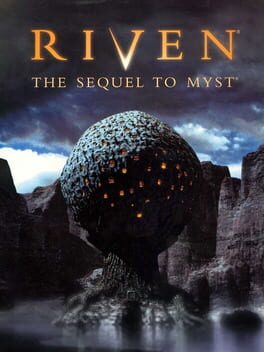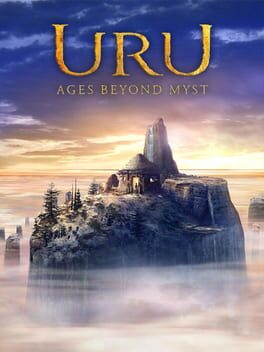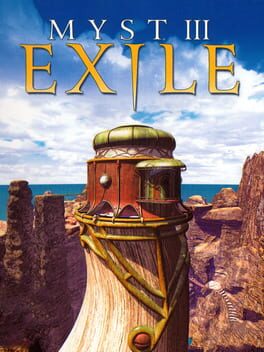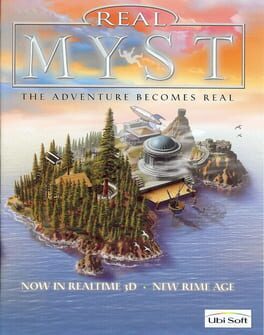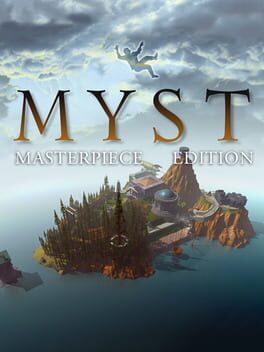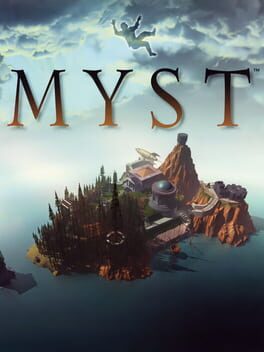

Prepare to enter a world "torn asunder" by timeless, unresolved conflicts--a world of incomparable beauty, intrigue, and betrayal. Prepare to go to Riven. Journey through vast, awe-inspiring landscapes, where clouds sit nestled in a deep blue sky and the rolling sea waters shimmer from bright morning sunlight. But be forewarned: nothing is quite as it seems.
Also in series
Released on
Genres
Reviews View More
My favorite video game. This came out before I was born and I played it in my mid-twenties.
No game I've experienced has captured a feeling of being lost as uniquely as Riven. The game is huge both because it is physically huge and because it forgoes the creature comforts of most video games, down to requiring you to get out an actual notebook and decide what's important and how it matters. Having no guardrails is terrifying. The fear that you won't find your way back is a fear as valuable as any enemy. A sense of paranoid isolation rests in communication with both the environment/gameplay so cohesively that I'm compelled to interrogate the dichotomy.
The balance between Riven's concept of its scale and the detail that allows Riven's scale to actually land rivals any open world game. The way the puzzles and plot are intertwined and communicate "with" each other through the environment allows (and in some cases requires) you to exercise real listening. Not reading.
The detail and love in the sound design makes that listening so much easier to summon. It's mixed with such a wide dynamic range and gets away with it. When matching its ambiences with the sound of your room, large things are LOUD.
The fixed perspective allowed by (not limited by) its delineated, prerendered screen states Is used to astounding aesthetic potential, The fixed perspective is drawn from in its audiovisual design, and traces every moment. Screens act as individual snippets of time and place, which allows for exceptionally intricate, unsystematized, human tracing of the feeling of every moment, down to the relationship between engine and birds, how light and shadow is cast, diffused, framed. The intensity, width and location of an echo in a cavern as you enter. Timbres individual to every screen. Decisions instead of algorithmically defined and tuned gradients and Instructions meant to adapt libraries of sounds of generalized activity (cultivated to not be too distinct from one another) to every context.
Did I mention that the game is fun and looks cool and is silly and you feel smart solving the puzzles. And you get an additional artifact from playing the game in the form of a physical notebook that you can then cherish and reminisce upon.
No game I've experienced has captured a feeling of being lost as uniquely as Riven. The game is huge both because it is physically huge and because it forgoes the creature comforts of most video games, down to requiring you to get out an actual notebook and decide what's important and how it matters. Having no guardrails is terrifying. The fear that you won't find your way back is a fear as valuable as any enemy. A sense of paranoid isolation rests in communication with both the environment/gameplay so cohesively that I'm compelled to interrogate the dichotomy.
The balance between Riven's concept of its scale and the detail that allows Riven's scale to actually land rivals any open world game. The way the puzzles and plot are intertwined and communicate "with" each other through the environment allows (and in some cases requires) you to exercise real listening. Not reading.
The detail and love in the sound design makes that listening so much easier to summon. It's mixed with such a wide dynamic range and gets away with it. When matching its ambiences with the sound of your room, large things are LOUD.
The fixed perspective allowed by (not limited by) its delineated, prerendered screen states Is used to astounding aesthetic potential, The fixed perspective is drawn from in its audiovisual design, and traces every moment. Screens act as individual snippets of time and place, which allows for exceptionally intricate, unsystematized, human tracing of the feeling of every moment, down to the relationship between engine and birds, how light and shadow is cast, diffused, framed. The intensity, width and location of an echo in a cavern as you enter. Timbres individual to every screen. Decisions instead of algorithmically defined and tuned gradients and Instructions meant to adapt libraries of sounds of generalized activity (cultivated to not be too distinct from one another) to every context.
Did I mention that the game is fun and looks cool and is silly and you feel smart solving the puzzles. And you get an additional artifact from playing the game in the form of a physical notebook that you can then cherish and reminisce upon.
This review contains spoilers
There was something really gratifying about realizing what the Black Moiety password was based on this time after having been filtered by it a year ago, as a tangible marker of having become a more attentive listener. Let it never be said that getting into classical music for a girl is a bad thing.
Where Myst established, for better or worse, what a puzzle in a videogame would look like from that point onward, Riven barely feels like a game about puzzles: it presents a counterintuitive setting from a couple perspectives and asks the player to pay enough attention to make sense of it. The extent to which one has to really understand the Rivenese to do so is a bit overstated, as is its difficulty (I don't think any puzzle other than the aforementioned password is truly all that difficult, as long as one's reading the books). But it's still enormously successful at joining its setting to the way in which it's played, and in using a deepening understanding of the setting as a means of progression. Catherine's diary is very nicely placed at the point when the player's likely to grasp that setting as well as she ever will, a point that lends it some pathos and parallels the player's position, joined to and apart from the world around her.
A game structured like this is inevitably going to be at its best when one's still figuring out the rules of its world, but even accounting for this the ending sequence is disappointingly clean and hurried. None of the melancholy, the alienation, or the sense of doom the game's built up comes to anything: Gehn falls for the same trick the player might have in the first game, and the Rivenese get a cool new orb to live in.
I'd like to think that Tay looks the way it does because of Catherine's unhappiness during its composition, forcing everyone in it to live in a perpetually overcast world because she felt it'd be nice at the time. I kind of expected her to stay behind in the end and so was a bit disappointed that Eti did not, in fact, win the long game against Atrus despite her apparently undiminished beauty and warmth.
Where Myst established, for better or worse, what a puzzle in a videogame would look like from that point onward, Riven barely feels like a game about puzzles: it presents a counterintuitive setting from a couple perspectives and asks the player to pay enough attention to make sense of it. The extent to which one has to really understand the Rivenese to do so is a bit overstated, as is its difficulty (I don't think any puzzle other than the aforementioned password is truly all that difficult, as long as one's reading the books). But it's still enormously successful at joining its setting to the way in which it's played, and in using a deepening understanding of the setting as a means of progression. Catherine's diary is very nicely placed at the point when the player's likely to grasp that setting as well as she ever will, a point that lends it some pathos and parallels the player's position, joined to and apart from the world around her.
A game structured like this is inevitably going to be at its best when one's still figuring out the rules of its world, but even accounting for this the ending sequence is disappointingly clean and hurried. None of the melancholy, the alienation, or the sense of doom the game's built up comes to anything: Gehn falls for the same trick the player might have in the first game, and the Rivenese get a cool new orb to live in.
I'd like to think that Tay looks the way it does because of Catherine's unhappiness during its composition, forcing everyone in it to live in a perpetually overcast world because she felt it'd be nice at the time. I kind of expected her to stay behind in the end and so was a bit disappointed that Eti did not, in fact, win the long game against Atrus despite her apparently undiminished beauty and warmth.
Colonialism filters through the patchwork of Myst and the avaricious, violent brothers, but the nature of the worlds explored and their founding by Atrus go without much interference in the text. Riven, however, demonstrates, alongside some novels I'll perhaps read one day, the degree to which the Art utilized by Atrus, Gehn, and Katran (to use her actual name) mimics the worrisome aspects and effects of colonialism, despite whatever ideals it promises, let alone the supremacy of the colonizers expressed by Gehn and his cultural hegemony. By all measures, this game should be the more influential title, not Myst: its wholly realized world; its courageous depth in making the player understand where they are to continue onward, including reading several long journals; and the ingrained dialectic of art as immersion and art as obfuscation (or, in this case, Art as immersion and Art as obfuscation) serve to provide a videogame several times improved. Frustrations in how to continue are nothing compared to the enormous impact of finding that path forward and the solutions to the few puzzles which exist. Riven instigates, in my mind, the eventual greatness of games like Outer Wilds or Gone Home by the complete realization of its world and how it is occupied by the player, and hopefully the remake will allow this to be clearer to modern players.
Riven improves upon the visuals, world, and storytelling of Myst while restructuring the nature of puzzles (possibly to subvert expectations) and results in a game that is understandably more memorable to those who overcome it.
However, it must be said that the changes to puzzles make Riven significantly harder than Myst, which is likely why it's oft-overlooked.
Riven has essentially three puzzles, all outlined at the very start: Save Catherine, trap Ghen, and signal Atrus.
There are some minor traversal puzzles in-between but they hardly even impede the player.
To achieve our three tasks we need to fully explore the island, discover and at least skim most if not all the journals, learn about the world and its culture/cultures, and deduce the nature, location, and solution to the three puzzles.
The visual storytelling bleeds directly into the puzzles, elements in that world that appear random slowly materialize into major clues, and with the wonders of modern hardware, traversing the island is smooth and enjoyable.
All that said, the three puzzles are not created equal. One of them was extremely satisfying, another was easy but deceptive, and the third was a level of moon logic so frustrating I nearly turned on the game entirely.
Possibly my experience was harmed by my color-blindness. a particular clue was entirely invisible to me until I sought a hint online.
Riven still succeeds in being far more than the sum of its parts. Less straightforward than Myst, but more organic and impactful. The story is more present in the gameplay of Riven as well and the superb scenes with FMV actors really make the whole world come to life. I was honestly shocked at how well the FMVs blend into the world.
Pre-rendered visuals are as close to an objectively poor choice as you can possibly make since the graphical fidelity will forever be locked to the exact original resolution at which they were rendered. barring some future restoration from the original files, which going by the lack of a remaster, was likely lost. I have a particular fondness for this graphical style, but it's inescapable just how low-rez it now looks on modern machines.
However, it must be said that the changes to puzzles make Riven significantly harder than Myst, which is likely why it's oft-overlooked.
Riven has essentially three puzzles, all outlined at the very start: Save Catherine, trap Ghen, and signal Atrus.
There are some minor traversal puzzles in-between but they hardly even impede the player.
To achieve our three tasks we need to fully explore the island, discover and at least skim most if not all the journals, learn about the world and its culture/cultures, and deduce the nature, location, and solution to the three puzzles.
The visual storytelling bleeds directly into the puzzles, elements in that world that appear random slowly materialize into major clues, and with the wonders of modern hardware, traversing the island is smooth and enjoyable.
All that said, the three puzzles are not created equal. One of them was extremely satisfying, another was easy but deceptive, and the third was a level of moon logic so frustrating I nearly turned on the game entirely.
Possibly my experience was harmed by my color-blindness. a particular clue was entirely invisible to me until I sought a hint online.
Riven still succeeds in being far more than the sum of its parts. Less straightforward than Myst, but more organic and impactful. The story is more present in the gameplay of Riven as well and the superb scenes with FMV actors really make the whole world come to life. I was honestly shocked at how well the FMVs blend into the world.
Pre-rendered visuals are as close to an objectively poor choice as you can possibly make since the graphical fidelity will forever be locked to the exact original resolution at which they were rendered. barring some future restoration from the original files, which going by the lack of a remaster, was likely lost. I have a particular fondness for this graphical style, but it's inescapable just how low-rez it now looks on modern machines.
Riven is a strange game. In many ways, it's more of a technical showcase and an atmospheric title rather than a game that belongs to any one genre. Point and click? Sure, but that implies more puzzles than Riven has.
Even if you're charitable, I think you can say that at most Riven has three puzzles. I've never seen a game attempt anything like this: Riven drops you into the world, and asks you to understand it. Its language and geography are main sources for the few head-scratchers this game has, and a lot of the actual gameplay is downtime, as you travel, look around, and find what you might've missed.
I'm not a patient gamer, but I can still say that Riven has one of the finest atmosphere ever crafted for a video game, which is an insane feat for a game from 1997. The world and its machinery feel like they belong and are there for specific functions.
The story is fairly basic, and, unfortunately, features a lot of reading. Despite the game having better cutscenes than Myst - they're in full-screen now! - most of the story and lore is told through books, which I don't think is an issue on its own, but they are paced fairly badly. You only get very few lore dumps, but they're not only really long, but also pretty hard to read due to cursive font used. I've enjoyed the story, but every time I had something to read I was taken out from the game as I was forced to squint at the screen reading hard-to-parse (at least for me) text for tens of minutes at a time.
I respect Riven, and I loved it in parts, but it's also a much more aimless game than Myst ever was. Maybe 95% of the time you don't really know what you're doing, until you notice certain patterns and a solution to one of the game's mega-puzzles comes to you. I think the puzzle design is incredible, with the decyphering in particular giving more lore to the world. There are also times where the game is just being a dick to you. For example, it really loves a certain "puzzle" where it'll hide doors behind opened doors, so you have to turn around and close them behind you to see a new passage. Few moments like this really soured me on the whole experience. The game's world is big, and I can only imagine the frustration if you've played this in 97 and swapped disks 20 times before realizing that you missed a door.
That said, I do absolutely think this game should be experienced. Its atmosphere is unmatched, its story is, even if somewhat simple, still gripping, and even if dated, its graphics and art are sometimes jaw-dropping.
Even if you're charitable, I think you can say that at most Riven has three puzzles. I've never seen a game attempt anything like this: Riven drops you into the world, and asks you to understand it. Its language and geography are main sources for the few head-scratchers this game has, and a lot of the actual gameplay is downtime, as you travel, look around, and find what you might've missed.
I'm not a patient gamer, but I can still say that Riven has one of the finest atmosphere ever crafted for a video game, which is an insane feat for a game from 1997. The world and its machinery feel like they belong and are there for specific functions.
The story is fairly basic, and, unfortunately, features a lot of reading. Despite the game having better cutscenes than Myst - they're in full-screen now! - most of the story and lore is told through books, which I don't think is an issue on its own, but they are paced fairly badly. You only get very few lore dumps, but they're not only really long, but also pretty hard to read due to cursive font used. I've enjoyed the story, but every time I had something to read I was taken out from the game as I was forced to squint at the screen reading hard-to-parse (at least for me) text for tens of minutes at a time.
I respect Riven, and I loved it in parts, but it's also a much more aimless game than Myst ever was. Maybe 95% of the time you don't really know what you're doing, until you notice certain patterns and a solution to one of the game's mega-puzzles comes to you. I think the puzzle design is incredible, with the decyphering in particular giving more lore to the world. There are also times where the game is just being a dick to you. For example, it really loves a certain "puzzle" where it'll hide doors behind opened doors, so you have to turn around and close them behind you to see a new passage. Few moments like this really soured me on the whole experience. The game's world is big, and I can only imagine the frustration if you've played this in 97 and swapped disks 20 times before realizing that you missed a door.
That said, I do absolutely think this game should be experienced. Its atmosphere is unmatched, its story is, even if somewhat simple, still gripping, and even if dated, its graphics and art are sometimes jaw-dropping.
